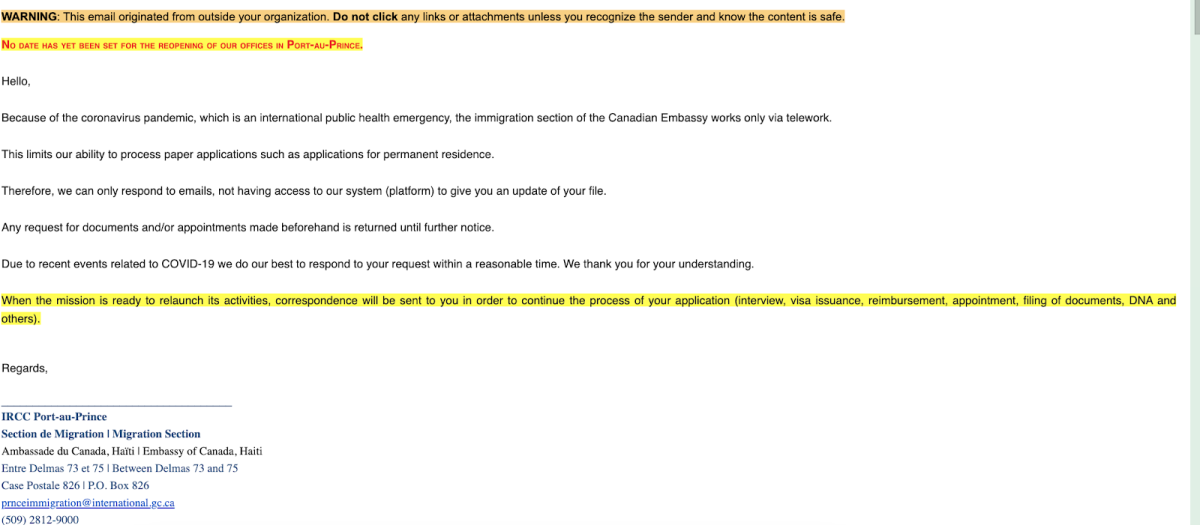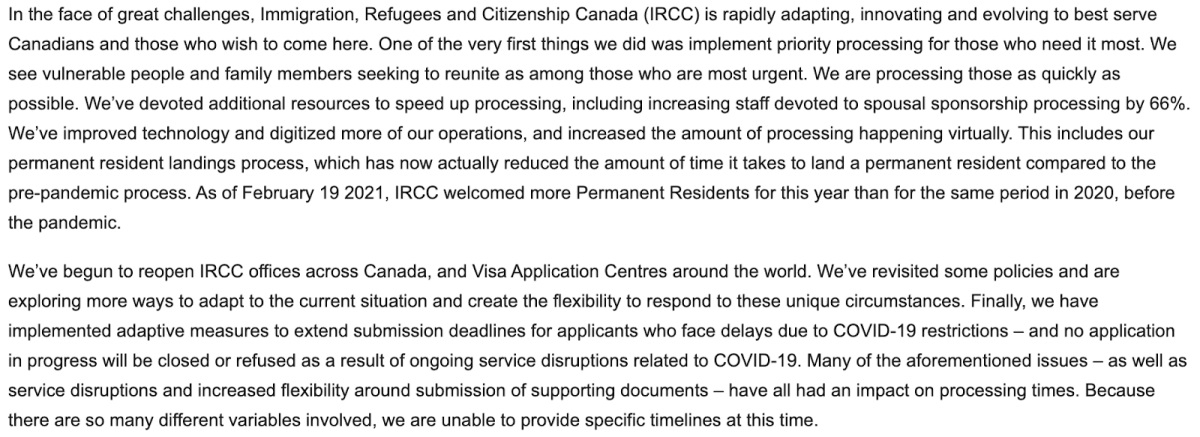Velaine Anis has been separated from her two young daughters since she left Haiti in 2015.

But since early 2020, Anis has been waiting for her daughters’ Canadian permanent residency (PR) applications to process. Delays and the lack of transparency on processing times for PR applications from Immigration, Refugees, Citizenship Canada (IRCC) are impacting Anis’ ability to reunite with her two children in Haiti.
Anis said the situation is difficult because she doesn’t know anyone her children can stay with.
“I’m very worried,” Anis said.
Anis initially came to Canada as a temporary move after her husband’s former political allies threatened her and her family.
Shortly thereafter, Anis’ husband was killed, leaving her two children, ages nine and 11, without a parent to watch over them.
As a result, Anis had her sister and a family friend watch her children. But ever since her sister moved away, Anis has been relying on her friend to care for her daughters.
At the beginning of the pandemic, Anis’ friend, who is currently watching her children, informed Anis she would no longer be able to care for her daughters since she’s moving to the Dominican Republic in April. Anis said that her friend had been delaying her move to continue helping her.

In 2019, after four years of living in Canada, Anis was granted PR under humanitarian and compassionate grounds. Since then, Anis and her lawyer, Laura Best, have been working to secure permanent residency for her daughters. In February 2020, their applications were submitted to the Immigration department of the Canadian Embassy in Haiti, which is an international branch of the IRCC. Anis and her lawyer are still awaiting approval.
After not receiving any updates from Immigration, Best submitted an urgent processing request in September 2020 in order to ensure Anis would be able to reunite with her children in Canada, and prevent them from being left alone with no one to take care of them.
Best submitted a follow-up in January this year, but neither Anis nor her lawyer have received any update from the IRCC.
The only response from the IRCC that Best received was one from September 2020, which states, “due to the recent events related to COVID-19 we do our best to respond within a reasonable time.”
“(The children have) already been examined. They already had their medicals done as part of (Anis’) application. They already filed all their documents as part of Velaine’s applications years ago. So, it’s not complicated. It’s not an actually complex case. It’s straightforward,” Best said.
Delays in PR application processing times are not new, but the pandemic has introduced new obstacles, including reduced staffing, as well as government departments moving to telework service, thereby limiting their ability to process paper applications.
But when asked about how long application processing takes, compared to one being processed via telework, the IRCC said in a statement that it “does not currently track data comparing the processing times of applications done by in-office staff versus remote work.”
The department also added that it has “improved technology and digitized more of our operations, and increased the amount of processing happening virtually.”
According to the IRCC, the department “completed 29,700 permanent resident application final decisions across all permanent resident business categories” in November 2020, which it states is similar to pre-pandemic numbers from February 2020.
In her experience as an immigration lawyer, Best said the average processing time for a PR application for family sponsorships is about a year. And the applications for Anis’ children have passed this average time, despite this sponsorship involving dependent children who are at risk of losing their home and guardian.
“In this case, it has already exceeded normal processing times even though children are supposed to be prioritized. The problem is that immigration doesn’t have clear processes. It’s not public what order they process things in, or when they say they’ll make it a priority. They don’t provide any guarantees,” Best said.
“We’re a year in and if you can’t figure out a year in how to get small children reunited with their parents, then you really need to rethink what you’re spending your energy, time and money on.”
In a statement to Global News, the IRCC said, “one of the very first things we did was implement priority processing for those who need it most. We see vulnerable people and family members seeking to reunite as among those who are most urgent. We are processing those as quickly as possible.”
Later in the statement, it noted that “because there are so many different variables involved, we are unable to provide specific timelines at this time.”
On the IRCC website, applicants who are sponsoring family can check the processing times, and for general updates on their ongoing applications. However, the page states due to COVID-19, the department is unable to “process applications normally” or provide accurate processing times.
When Best reached out to the Canadian Embassy in Haiti about Anis’ daughters’ applications, she received a similar response.
Global News also reached out to the in Canadian Embassy in Haiti for comment but did not hear back.
“I understand that the office (in Haiti) would be maybe 95 per cent closed because of COVID but you still need someone processing the urgent files,” Bert said.
The Canadian government’s definition of urgent PR applications includes two reasons: the death of a family member or the serious illness of a family member.
In January 2021, Prime Minister Justin Trudeau introduced a travel freeze, which suspended all air travel to and from Mexico and the Carribean until the end of April. This new regulation was introduced to stop Canadians from visiting popular tropical countries, after many travelled internationally over the winter.
However, this new policy restricts Canadians and permanent residents with family in the Caribbean and individuals who travel for essential reasons and emergencies, which means Anis cannot fly to Haiti to be with her children before they’re left alone with no one to care for them.
With no one else to care for her children, and no way to travel back, Anis worries for their wellbeing and safety.
“In Haiti, there’s a lot of gender violence. When the mother isn’t there to take care of the children, anything can happen to them,” she said.
In the fall of last year, the federal government introduced a new immigration plan to support economic recovery through immigration. This plan comes after the shortfall in PR admissions these last several months because of “global travel restrictions and capacity constraints.”
And yet, people with urgent applications, including Anis, are still waiting for transparency about processing times and updates.
The IRCC went on to say it “recognizes the importance of family reunification and Canada’s global commitment to protecting those most at risk through refugee resettlement.”
“There is capacity in the government to process the application. It’s not because they can’t, it’s because they won’t,” said Best.
On March 5, the IRCC announced a plan to expand its Case Processing Centre, hiring an additional 62 new employees in order to process more applications, shorten processing time, and reunite families.
Carol Eugene Park is a Vancouver-based journalist, and producer for Decomplicated podcast. She enjoys internet culture and Gen-Z lingo. Find her on Twitter: @caroleugenepark





Comments